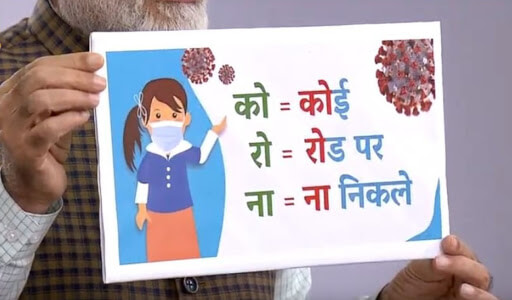At 8 pm yesterday, Indian Prime Minister Narendra Modi announced a 21-day total national lockdown as a measure to contain the novel coronavirus. As of this morning, India has reported 519 cases and 9 deaths from the virus.
A summary of the Governmental guidelines are as follows:
- Government offices at the Central, State, and Union Territory levels will remain closed. Exceptions have been made for defence, police, public utilities (including electricity, water, sanitation petrol, CNG, LPG, PNG), fire and emergency services, disaster management, power generation and transmission units, prisons, post offices, district administrations, municipal bodies, and the National Informatics Centre. All these offices will be working with a minimum number of employees, while the rest must work from home.
- Hospitals and all other related medical establishments in their supply chain–manufacturing and distribution units, dispensaries, chemists, clinics, nursing homes, ambulances, etc.–will remain functional. This includes veterinary care. Transportation for medical personnel including nurses and paramedical staff, along with other hospital support services will continue to run.
- All commercial and private businesses and establishments are to remain closed and employees are to work from home. Exceptions are being made for public and private grocery shops and ration shops under the PDS, banks and ATMs, print and electronic media, broadcasting, internet, telecommunications, e-commerce delivery platforms, petrol pumps, power distribution units, debt market services, cold storage, warehouses, and private security firms.
- All industrial establishments will be closed except those used to manufacture essential commodities.
- All transport services will be suspended, except for emergency services (fire, law and order, ambulances) and the transportation of essential goods. This includes air, rail, and roadways.
- All educational and training institutes and places of worship are to be closed without exception. There is a blanket ban on all religious, political, social, sports, or entertainment event gatherings. Funerals can take place with a maximum congregation of 20 people.
- Those who have been instructed to remain under strict quarantine will be liable for legal action under Section 188 of the IPC if they fail to follow orders.
Source: Ministry of Home Affairs
Below is a list of safety guidelines to cope with the lockdown:
DO:
- Stay at home and practice social distancing. Here is a list of ways to ensure that your time spent at home is productive and fun. The WHO has also come up with special guides for parents and employers during these trying times.
- Maintain at least 3 ft distance from those around you while sneezing or coughing.
- Wash your hands frequently with soap and water and use alcohol-based sanitizers.
- Avoid touching your eyes, nose, and mouth.
- While sneezing or coughing, cover your nose and mouth with a tissue or with your elbow. Throw away the used tissue immediately.
- Ensure the safe and sustainable disposal of any biomedical waste, including used tissues and masks.
- Donate to NGOs and causes that are providing healthcare facilities and grocery rations to daily wage workers and vulnerable communities.
- Consider giving your home staff paid leave until restrictions are lifted.
- Stay informed on new updates from WHO and the Indian government. You can subscribe to the WHO’s WhatsApp updates or the MyGov’s Telegram channel for the same.
DO NOT:
- Buy and wear a medical face mask if you do not need it. Healthcare authorities are running desperately short of the same. Use a mask only if you are facing cold/flu-like symptoms or caring for a COVID-19 positive patient and use them in conjunction with the hygiene guidelines mentioned above.
- Hoard groceries and supplies from stores and e-commerce sites. The Centre and State governments have assured us that the supply chain of essential commodities will continue. Please keep in mind that more vulnerable people and communities need daily goods as much as you do.
- Go outside or travel, even if it is hot and humid. The WHO has announced that evidence so far has proven that the virus can survive and be transmitted even in hot and humid climates. Further, local police are stationed at various points and may forcibly send you back home if you are deemed to be outside without a legitimate reason.
- Use unprescribed medication or alternative suggestions like cow urine, chlorine, and chloroquine to treat your symptoms. Please reach out to any of the emergency COVID-19 helplines or seek medical help if you are falling ill.
- Share or believe unverified videos or information being floated on WhatsApp and social media. Check the sources and facts yourself before sharing with others.
Stay home and stay safe!
Image Source: Hindustan Times

